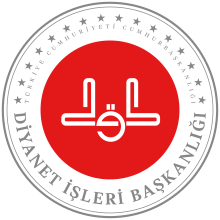
Back رئاسة الشؤون الدينية التركية Arabic Dəyanət işləri üzrə rəhbərlik (Türkiyə) Azerbaijani ধর্ম বিষয়ক অধিদপ্তর Bengali/Bangla Diyanet İşleri Başkanlığı German Présidence des Affaires religieuses French Uprava za vjerske poslove Turske Croatian Diyanet ID Direttorio per gli affari religiosi Italian 국가 종무국 Korean Diyanet Dutch
 Logo of the Directorate of Religious Affairs | |
| Formation | 3 March 1924 |
|---|---|
| Type | Islamic education, religious administration |
| Headquarters | Ankara, Turkey |
| Location | |
Official language | Turkish |
President | Ali Erbaş |
Budget | $2 billion (2020)[1] |
| Website | Official website |

The Directorate of Religious Affairs in Turkey (Turkish: Diyanet İşleri Başkanlığı, normally referred to simply as the Diyanet) is an official permanent state institution established in 1924 by the orders of Mustafa Kemal Atatürk[2] under article 136 of the Constitution of Turkey[3] to carry out some of the administrative duties previously managed by the Shaykh al-Islām, before the abolition of the Ottoman Caliphate.[4] The President of the Directorate of Religious Affairs is considered the Grand Mufti of Turkey.
As specified by law, the duties of the Diyanet are “to administer the affairs related to faith and worship of the religion of Islam”.[4] The Diyanet drafts a weekly sermon delivered at the nation's 85,000 mosques and more than 2,000 mosques abroad that function under the directorate. It provides Quranic education for children and trains and employs all of Turkey's imams, who are considered civil servants.[5]
Starting from 2006, the Diyanet was fortified, by 2015 its budget had increased four-fold,[6][7] and staff doubled to nearly 150,000.[6] Its 2019 budget has been estimated at €1.7 billion ($1.87 billion), far exceeding that of most Turkish government ministries.[8] It has 1,000 branches across Turkey and offers educational, cultural, and charitable activities in 145 countries.[8] Diyanet TV was launched in 2012,[9] now broadcasting 24 hours a day.[6] It has expanded Quranic education to early ages and boarding schools – "enabling the full immersion of young children in a religious lifestyle"[9] – and now issues fatwa (Turkish: fetva) on demand.
- ^ "Turkey's top religious body to spend $11 billion by 2023". Ahval News. Archived from the original on 20 February 2022. Retrieved 19 August 2020.
- ^ "Kurumsal". Archived from the original on 2017-10-07. Retrieved 2021-11-11.
- ^ "Turkish Constitution | Anayasa Mahkemesi". Archived from the original on 2021-01-10. Retrieved 2021-11-11.
- ^ a b Establishment and a Brief History Archived 2022-07-09 at the Wayback Machine, Presidency of Religious Affairs
- ^ "Top cleric delivers Friday sermon in Mardin". hurriyetdailynews.com. 5 February 2016. Archived from the original on 2017-08-19. Retrieved 2016-07-21.
- ^ a b c Lepeska, David (17 May 2015). "Turkey Casts the Diyanet". Foreign Affairs. Archived from the original on 7 August 2022. Retrieved 27 July 2016.
- ^ "2006 Mali Yilin Bütçesi" (in Turkish). Alo Maliye. Archived from the original on 2008-10-04. Retrieved 2008-08-22.
- ^ a b "Diyanet: The Turkish religious authority that makes millions". DW. 20 September 2019. Archived from the original on 12 September 2022. Retrieved 31 January 2021.
- ^ a b Cite error: The named reference
risewas invoked but never defined (see the help page).
© MMXXIII Rich X Search. We shall prevail. All rights reserved. Rich X Search